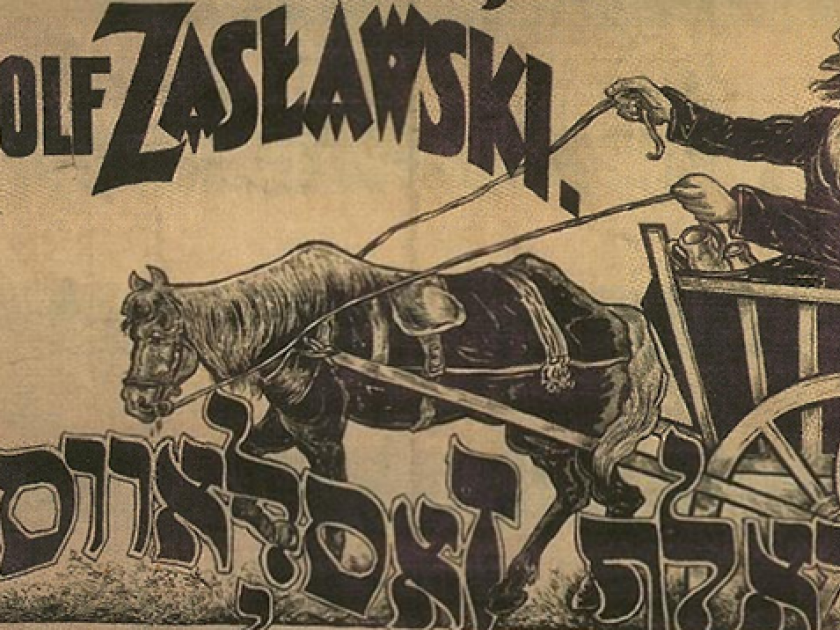
Sharon Leder, author of The Fix: A Father’s Secrets, A Daughter’s Search, will be blogging here all week for the Jewish Book Council’s Visiting Scribe series. Check back here throughout the week to read more from her.
In my previous post, I wrote about the deep profiling of character that Philip Roth achieves in American Pastoral, enabling the reader to understand how a privileged youngster of the 1960s becomes a terrorist. Merry Levov’s evolution convinced me I could find a way to make my character, Sara Katz, more sympathetic than the radical feminist in the original version of my manuscript of The Fix: A Father’s Secrets, A Daughter’s Search. Today, I’ll discuss Yiddish writer Sholem Aleichem’s skill at using dialogue to develop the characters of Tevye’s daughters in Tevye the Dairyman (1894−1914), and how I then amplified dialogue between my young Sara and her father, Josef, a heroin addict, in flashbacks in my novel to illustrate my characters’ complexities.
Sholem Aleichem: Tevye the Dairyman’s Daughters
Aleichem, storyteller par excellence on whose Tevye the musical “Fiddler on the Roof” is based, taught me I needed more dramatic dialogue between Sara and her father to make their characters more convincing, more alive. Tevye’s dialogues with his daughters brilliantly illustrate the way parental influence really works. Each time a defiant daughter of Tevye marries, his great conscious obsession to have his daughter marry rich is undermined. The father-daughter dialogues reveal that the daughters are much more like Tevye than he is willing to admit. In choosing husbands, the daughters express Tevye’s own fantasies and values, even his unconscious ones.For example, Chava, the daughter Tevye loves the most, is ironically the most transgressive because she marries Chvedka out of her religion, a goy! Aleichem’s sparkling, humorous dialogue shows Chava taking to heart — more than Tevye ever imagined — her father’s yearnings for a more equal and democratic Russia free of unfair class structure, especially when Chava says to Tevye in defense of Chvedka, “God … created us all equal.” Tevye’s response shows his witty manipulation of language, “‘So He did,’ I say. ‘He created man in His likeness. But you had better remember that not every likeness is alike.’”
How could I use dialogue to show that in spite of Sara’s father’s addiction, Josef also could be a positive influence on Sara’s activism? The Tevye his daughters defy is a complex, many-layered character whose bottom line is his love for his family. Could I follow Aleichem’s model and create a more complex Josef? I did not want to present my protagonist’s father as a villain. Could dialogue show the necessary nuances?
The published novel, The Fix, includes many more scenes filled with dialogue between the child Sara and her father than did the original manuscript of 2006. One such scene occurs on a Saturday, a Shabbos afternoon. Josef takes Sara to Manhattan with him to get Johnny Mathis’s signature at a Sam Goody’s record store and to meet customers on the Upper West Side to whom Josef, a butcher, delivers kosher meats and poultry. But on the drive home, he makes a stop in Greenwich Village, where Sara sees a black man quickly pass something to Josef-something he places in his pocket.
“These people seem different,” Sara says out loud. “Do they all get along together?”
“Down here,” Josef says … “lots of different people mix with one another.”
“This is the first time I’ve seen a Negro man with a white woman,” Sara says. … Wouldn’t it be nice, she thought, to have a Negro friend? … “What about those other people on the street?” Sara asks. “Like those two men holding hands. Do you know them?”
“They’re homosexuals, Sara,” Josef says. “They like to be with people of the same sex. Good people come in all colors and sexes. The important thing is not to judge someone because of what you see on the outside.”
When Josef and Sara arrive home, and Sara’s mother, Helen, asks if all is okay, Sara excitedly shouts, “We went to Greenwich Village and saw homosexuals and lots of Negroes with white people.” Helen’s smile turns to a frown, and she asks suspiciously why Josef has taken Sara to the Village. He replies that Helen can’t keep Sara in a shell forever. Sara is ten, and though she knows her father has sneaked something wrong into his pocket, the positive lessons she learns about integration and tolerance stay with her for her entire life. In the process of making his connection, the drug-addict dad has taught his daughter how to be a human being.
Because I saw how the use of dialogue could enable me to humanize Josef, I created more and more scenes between the young Sara and her father.I was then left with many other new flashbacks and dream scenes of the young Sara’s life in school, of her relationships with friends, and of her relationship with her mother, who relied on Sara as a confidante. I wondered how I could integrate this new material with the struggling adult, Sara, who found it difficult holding onto jobs in the field of women’s studies when the conflicts she had with male administrators threatened her career. I found my answer after studying the “A Mind of Her Own: Fathers and Daughters in a Changing World” seminar’s coming-of-age novels by Anzia Yezierska, Johanna Kaplan, and Myla Goldberg that I will discuss in my final Prosen People segment.
Dr. Sharon Leder Associate Professor Emerita is a natural organizer who founded Jewish Studies at S.U.N.Y.-Nassau Community College. Past Vice President of Am HaYam Cape Cod Havurah she currently serves its Interfaith Justice Committee. With Milton Teichman she edited “Truth and Lamentation: Stories and Poems on the Holocaust” (University of Illinois) nominated for the National Jewish Book Award.